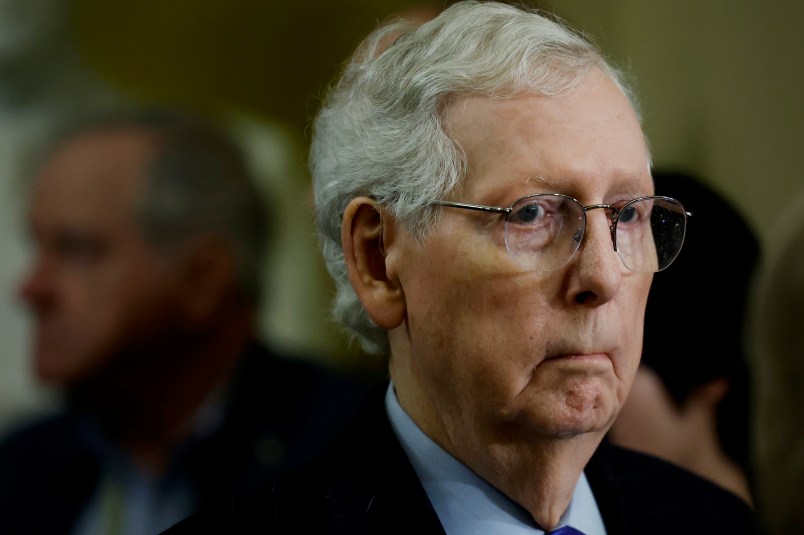Senate Minority Leader Mitch McConnell (R-KY), joined by a conservative law professor and judges, complained Thursday about the Judicial Conference’s announcement of a new policy to crack down on the judge-shopping that has been so beneficial to right-wing litigants.
The Judicial Conference, the policymaking body for federal courts, revealed Tuesday that it would unroll a new policy to randomize the assignment of cases seeking nationwide injunctions on federal or state action. This would stymy litigants from repeatedly filing in divisions with only one judge (see: Judge Matthew Kacsmaryk in Amarillo) to significantly up the odds of a friendly ruling with the power to at least temporarily block a federal government policy for the entire country. Right-wing litigants (including the state of Texas) have frequently returned to a handful of Trump judges in divisions where they get most or all of the cases to combat Biden administration actions.
While the announcement didn’t link to policy text and was scant on enforcement details, experts expressed enthusiasm to TPM that the Judicial Conference felt compelled to act on the blatant court manipulation, mixed with reservations about how binding the new policy will be.
While judge shopping has given right-wing litigants a string of high-profile wins — the mifepristone case to be argued before the Supreme Court this month, coming up from Kacsmaryk’s courtroom, is a prominent example — it’s also profoundly reshaped the legal landscape. It helps conservative litigants fast-track cases, even those on wobbly legal footing, to the appellate courts and, sometimes, to the Supreme Court. It reshapes the dockets for those higher courts, permeating them with the causes célèbres of the right. And it advances in leaps and bounds long-held pet projects of the conservative legal world, including the war on the administrative state.
Given those enormous benefits to them, many on the right are not taking the news well.
“Didn’t Chief Justice Roberts say ‘there are not Obama judges or Trump judges?’” McConnell huffed from the Senate floor Thursday. “What exactly is the problem that demands such a drastic solution?”
He digressed into hypotheticals about a young woman challenging abortion laws or a veteran defending his gun rights being forced to travel to far-flung locations to fight their case. In reality, this is often the dynamic under a judge-shopping regime; the Justice Department has near-stock briefs complaining about the hassle of trekking to Amarillo every time Texas challenges the administration there.
McConnell also urged lower courts to ignore the guidance, again raising questions about how ironclad the new policy will be.
“This was an unforced error by the Judicial Conference,” he said. “I hope they will reconsider, and I hope district courts throughout the country will instead weigh what is best for their jurisdictions, not half-baked guidance that does Washington Democrats’ bidding.”
McConnell wasn’t the only one put out by the new policy.
Prominent conservative law professor Josh Blackman wrote that the only way to “depoliticize” the courts is for Congress, not the judges themselves, to act on the issue (Congress created what was later renamed the Judicial Conference in 1922).
A few right-wing judges were so riled up that they issued statements.
“Judges are supposed to follow the laws enacted by Congress, not bend the rules in response to political pressure,” said Judge James Ho, a Trump appointee on the Fifth Circuit Court of Appeals (who once wrote that “unborn babies” being “a source of profound joy” for doctors doing ultrasounds is a serious argument against providing abortions).
“If reformers are sincerely troubled by venue shopping, they can start by examining the serious concerns that have been voiced about our Nation’s bankruptcy and patent dockets,” he added, oddly referring to a judge-shopping scheme in Waco focused on patent cases that prompted similar pushback from judicial bigwigs (including Chief Justice John Roberts), ultimately prompting the district to randomize case assignments.
Randy Crane, a W. Bush appointee and chief judge of Texas’ Southern District, said that the policy change “seems to be a response to decisions adverse to certain political interests, given its timing,” per Reuters.
Judge Edith Jones, a Reagan appointee and Ho’s peer on the Fifth Circuit, questioned whether the new policy runs afoul of the federal rule giving district courts control over their own dockets, sighing that it “spawned complications.”
The Judicial Conference will send out a memo to federal judges this week, and plans to produce final text in the coming months, when the extent of the wiggle room for unhappy conservatives will become clear.







STFU McConnell, ya whiney dick.
“We spent a lot of time rigging the courts,” McConnell whined. “Now you’re messing up our years long carefully orchestrated plans to stack the courts.”
How long ago was it that “judicial activism” was a horror to those on the right? Same for “lawsuits” and “it’s not about the sex it’s about the lying”. They don’t stand for shit.
Whaddayamean we can’t cheat the system?
McConnell is second only to TFG in the responsibility for the damage that has been done to our democracy in the last decade. He’s educated, informed and politically savvy but not crazy. So what’s his excuse?